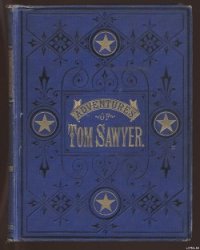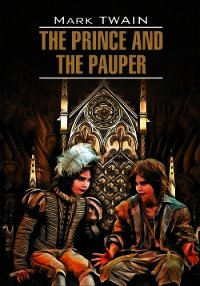Английский язык с Марком Твеном. Принц и нищий (Mark Twain. The Prince and the Pauper) - Twain Mark (читать хорошую книгу полностью .txt) 📗
oath [qu?], reasonable [`ri:z(?)n?bl], despair [d?s`pe?]
He was moving away, still talking; the constable hesitated, fidgeted, spat an oath or two, then cried out:
'Hold, hold, good sir — prithee, wait a little — the judge! why man, he hath no more sympathy with a jest than hath a dead corpse! — come, and we will speak further. Ods body! I seem to be in evil case — and all for an innocent and thoughtless pleasantry. I am a man of family; and my wife and little ones — List to reason, good your worship; what wouldst thou of me?'
'Only that thou be blind and dumb and paralytic whilst one may count a hundred thousand — counting slowly,' said Hendon, with the expression of a man who asks but a reasonable favor, and that a very little one.
'It is my destruction!' said the constable despairingly. 'Ah, be reasonable, good sir; only look at this matter, on all its sides, and see how mere a jest it is — how manifestly and how plainly it is so. And even if one granted it were not a jest, it is a fault so small that e'en the grimmest penalty it could call forth would be but a rebuke and warning from the judge's lips.'
Hendon replied with a solemnity which chilled the air about him:
'This jest of thine hath a name in law — wot you what it is?'
'I knew it not! Peradventure I have been unwise. I never dreamed it had a name — ah, sweet heaven, I thought it was original.'
'Yes, it hath a name. In the law this crime is called Non compos mentis lex talionis sic transit gloria mundi.'
'Ah, my God!'
'And the penalty is death!'
'God be merciful to me, a sinner!'
'By advantage taken of one in fault, in dire peril, and at thy mercy, thou hast seized goods worth above thirteen pence ha'penny, paying but a trifle for the same; and this, in the eye of the law, is constructive barratry, misprision of treason, malfeasance in office, ad hominem expurgatis in statu quo — and the penalty is death by the halter, without ransom, commutation, or benefit of clergy.'
'Bear me up, bear me up, sweet sir, my legs do fail me! Be thou merciful — spare me this doom, and I will turn my back and see naught that shall happen.'
'Good! now thou'rt wise and reasonable. And thou'lt restore the pig?'
'I will, I will, indeed — nor ever touch another, though heaven send it and archangel fetch it. Go — I am blind for thy sake — I see nothing. I will say thou didst break in and wrest the prisoner from my hands by force. It is but a crazy, ancient door — I will batter it down myself betwixt midnight and the morning.'
'Do it, good soul, no harm will come of it; the judge hath a loving charity for this poor lad, and will shed no tears and break no jailer's bones for his escape.'
CHAPTER XXV (Глава двадцать пятая)
AS soon as Hendon and the king (так скоро как = как только Хендон и король) were out of sight of the constable (оказались вне поля зрения констебля), his majesty was instructed to hurry (его величество был проинструктирован поторопиться) to a certain place outside the town (к определенному месту за городом), and wait there (и ждать там), whilst Hendon should go to the inn (пока Хендон пойдет в харчевню) and settle his account (и уладит свой счет = оплатит счет). Half an hour later (полчаса спустя; later — позже) the two friends were blithely jogging eastward (два друга блаженно ехали трусцой на восток) on Hendon's sorry steeds (на жалких конях Хендона). The king was warm and comfortable now (королю было тепло и удобно теперь: «был теплый и испытывающий удобство»), for he had cast his rags (ибо он сбросил свои лохмотья; to cast — бросать) and clothed himself in the second-hand suit (и облачился в поношенный костюм; second-hand — бывший в употреблении: «вторая рука») which Hendon had bought on London Bridge (который Хендон купил на Лондонском мосту; to buy — покупать).
Hendon wished to guard (Хендон желал предохраниться) against over-fatiguing the boy (против того, чтобы переутомлять мальчика; to over-fatigue — пере-утомлять); he judged (он рассудил) that hard journeys (что тяжелые путешествия), irregular meals (нерегулярное питание), and illiberal measures of sleep (и ограниченные меры = недостаток сна) would be bad for his crazed mind (были бы плохи для его помутненного ума), while rest (в то время как отдых), regularity (размеренность), and moderate exercise (и умеренные упражнения) would be pretty sure to hasten its cure (были бы весьма верны, чтобы ускорить его лечение = конечно, ускорят); he longed to see (он жаждал увидеть) the stricken intellect made well again (пораженный интеллект сделанным здоровым снова) and its diseased visions (а его болезненные видения) driven out of the tormented little head (выгнанными из измученной маленькой головы; to drive out); therefore he resolved to move by easy stages (поэтому он решился передвигаться легкими = недолгими переходами) toward the home (к дому) whence (откуда) he had so long been banished (он так давно изгнан), instead of obeying the impulse of his impatience (вместо того, чтобы подчиниться импульсу его нетерпеливости) and hurrying along night and day (и спешить вперед ночь и день).
When he and the king had journeyed about ten miles (когда он и король прошли около десяти миль), they reached a considerable village (они достигли большой деревни), and halted there for the night (и остановились там на ночь), at a good inn (в хорошей харчевне). The former relations were resumed (прежние отношения были возобновлены); Hendon stood behind the king's chair (Хендон стоял за стулом короля; to stand — стоять) while he dined (пока тот кушал), and waited upon him (и прислуживал ему); undressed him when he was ready for bed (раздевал его, когда тот был готов для постели); then took the floor for his own quarters (затем занимал пол в качестве своего собственного пристанища; to take — брать), and slept athwart the door (и спал поперек двери), rolled up in a blanket (завернутый в одеяло).
The next day (на следующий день), and the next day after (и на следующий день после), they jogged lazily along (они ехали трусцой лениво вперед) talking over the adventures they had met (толкуя о приключениях, которые они встретили; to talk over — обсуждать: «разговаривать относительно»; to meet — встречать) since their separation (со времени их расставания), and mightily enjoying (и сильно наслаждаясь) each other's narratives (рассказами друг друга; each other — друг друга: «каждый другого»). Hendon detailed (Хендон детально описал) all his wide wanderings (все свои дальние странствия) in search of the king (в поисках короля), and described how the archangel (и описал, как архангел) had led him a fool's journey (повел его в путешествие дурака = заставлял его плутать; to lead — вести) all over the forest (по всему лесу), and taken him back to the hut finally (и привел его назад к хижине наконец; to take — взять), when he found (когда он обнаружил; to find — найти) he could not get rid of him (что он не мог избавиться от него; to get rid of — избавиться от). Then (затем) — he said (он сказал) — the old man went into the bed-chamber (старик пошел в спальню; to go — идти) and came staggering back (и вернулся шатаясь назад) looking broken-hearted (выглядя убитым горем: «с разбитым сердцем»; to break — ломать; heart — сердце), and saying he had expected to find (и говоря, что он ожидал найти) that the boy had returned (что мальчик вернулся) and lain down in there to rest (и прилег там, чтобы отдохнуть; to lay down — лечь вниз), but it was not so (но это не так). Hendon had waited at the hut all day (Хендон прождал у хижины весь день); hope of the king's return (надежда на королевское возвращение) died out then (умерла затем), and he departed upon the quest again (и он отправился на поиски снова).




